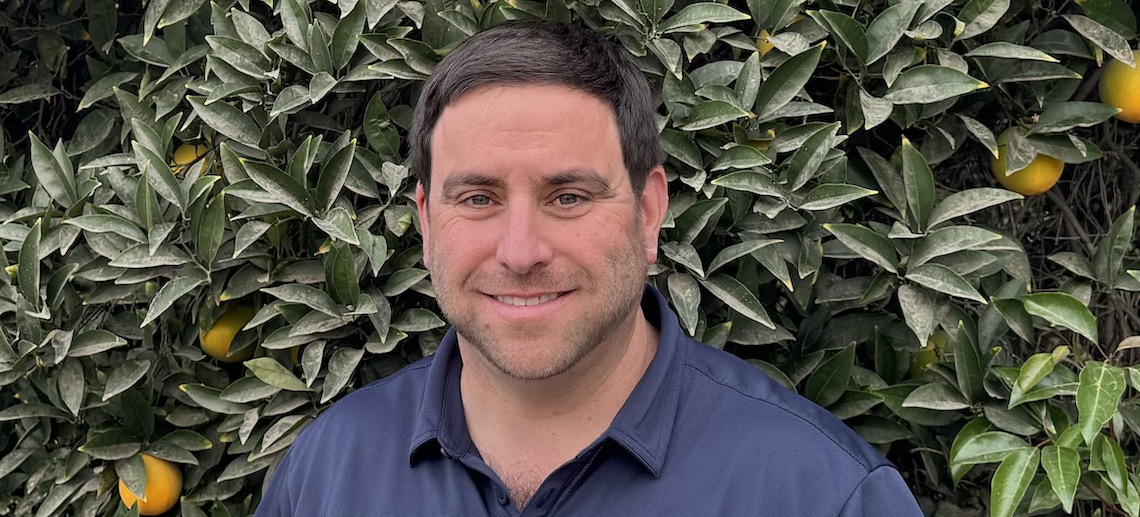
Fresno State grad Ben Letizia, one of the founders and president of Heritage Crop Sciences, is partnering with a Chilean company to introduce a new anti-bacterial products for plants. Photo contributed
Written by Frank Lopez
A South American biotech company has partnered with a local agriculture chemical company to roll out what they say are groundbreaking biological products in the U.S. market.
Heritage Crop Science of Fresno and Exacta Bioscience of Chile are collaborating to start the regulatory process for their new products, which combat bacterial disease.
Heritage Crop Sciences, founded in 2020, specializes in marketing proprietary and post-patent crop protection products, as well as plant growth regulators and foliar nutrition.
Exacta Bioscience specializes in next-generation biological crop protection, utilizing technology to bridge the gap between cutting-edge research and field-ready sustainable crop protection, according to a news release.
The two new products aim to address critical challenges in the field, offering effective and natural solutions for bacterial crop diseases — a growing problem spurred by the development of resistance to traditional control methods.
Fresno State grad Ben Letizia, one of the founders and president of Heritage Crop Sciences, comes from a farming background himself, carrying the family business. Letizia Farming grows almonds and raisins in the Selma area.
Today, Letizia’s farming main work is providing orchard and vineyard spraying, custom tractor work and farm management services in Fresno, Tulare, and Kings counties.
Letizia said they manufacture one of their own in-house products through one of Heritage’s companies, KIM-C1, and is doing the market for 6 products from three outside companies.
“Heritage’s main business is to provide sales and marketing for companies that don’t have a sales and marketing presence in California that they need to be successful,” Letizia.
There are strict regulatory paths that must be taken to get ag chemical products from a finished product to one that could be used in the field, Letizia said.
The collaboration with Exacta is a giant step for Heritage, but Letizia believes Exacta’s new products are “game changing” enough, with the disruption it could bring to the market being worth the time and money involved.
They will make a submission to the Environmental Protection Agency most likely in the second quarter of 2025.
The new products are low-risk pesticides, unlike traditional pesticides that require massive amounts of environmental and human-health testing, Letizia said.
“It’s going to probably be a 3-year process, and we should have them on the market by 2028,” Letizia said.
The two new products are meant to innovate, he said, and will do the same job as conventional pesticides and give growers the same level of control for similar costs and require less applications and less chemical per acre.
Letizia said that even though the new products will work better, they will have to be offered at similar prices to solutions that are currently available in the market.
The products in the works from Exacta are fermented, and is a completely different approach to the control of bacteria for the specific species of plants.
One of the products will be used for walnuts and hazelnuts, and the other for prunus genus, which includes plums, cherries, peaches, nectarines, apricots and almonds.
In past decades, ag chemical products including insecticides and fungicides, were killing things growers didn’t necessarily want to kill, but those were the only solutions available to growers at the time.
There are massive amounts of beneficial insects in the field, Letizia said, and Exacta’s products will be more targeted to certain pests that won’t disrupt everything else around.
“We are not affecting insects, either beneficial or bad. We are limiting the disruption to the ecosystem that may be build up in a specific field,” Letizia said.
Exacta’s products will allow for a decrease in the use of conventional chemicals used to fight bacterial infections, and provide longer residual control of bacterial species. That reduces the number of tractor trips, which lessens environmental impact, Letizia said.
Letizia said the products could reduce applications of pesticides from three down to one.
In California, manufacturers have to show the difference between treated and untreated crops in order to get the product registered and show the treated product is better.
Letizia said that going through the EPA approval process is very expensive, but the benefit of newer, softer products reduces the red tape, especially when compared to older, traditional chemistry.
The products in the works will be applied to crops in the Central Valley this coming spring for trial work, and are currently en route from Chile to the U.S.








